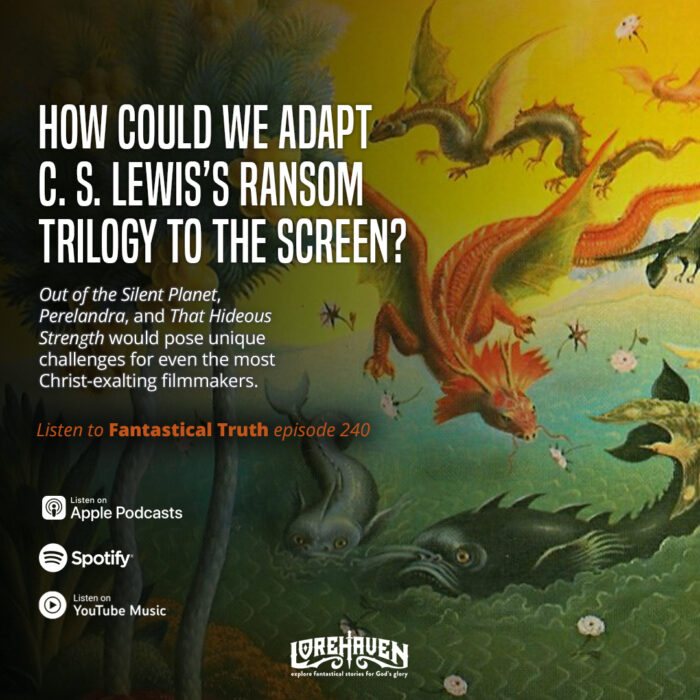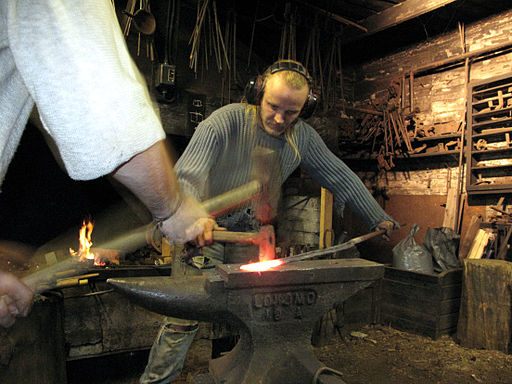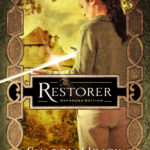Does Anybody Work In Speculative Fiction?
 Today is Labor Day in the US, so I thought it appropriate to think a little bit about speculative novels and work. My first thought was, Does anybody work? I mean, in epic fantasy, the protagonist and his crew are questing—traveling, for the most part, from one place to another in an effort to find, win, capture, or fulfill whatever the quest requires. Space opera doesn’t seem very different, but the principles are wondering the galaxy instead of roaming the countryside.
Today is Labor Day in the US, so I thought it appropriate to think a little bit about speculative novels and work. My first thought was, Does anybody work? I mean, in epic fantasy, the protagonist and his crew are questing—traveling, for the most part, from one place to another in an effort to find, win, capture, or fulfill whatever the quest requires. Space opera doesn’t seem very different, but the principles are wondering the galaxy instead of roaming the countryside.
So who works?
I know there are some stories that feature the prince or the warrior or the soothsayer. There are some centered around the dragon keeper (a nod in particular to Donita Paul and her DragonKeeper Chronicles); still others feature the assassin. These, of course, are professions, and there is a certain amount of work connected to what they do.
But who maintains the spaceship? Who cooks the dinner? Who shoes the horses? Who navigates the trail?
I think of the old westerns, which I’ve recently had the opportunity to view, and marvel that they are so well plotted, but also believably peopled with working characters. They have the scout and the cook and the wagon master.
 Star Trek, the original, included the same elements, (though, of course, the worker red shirts are inevitably the ones who die in a crisis). The spin-off series maintained that same bit of worldbuilding. Miles was the transporter chief and his wife a botanist. Deanna Troi was the ship’s counselor and Beverly Crusher, the chief medical officer.
Star Trek, the original, included the same elements, (though, of course, the worker red shirts are inevitably the ones who die in a crisis). The spin-off series maintained that same bit of worldbuilding. Miles was the transporter chief and his wife a botanist. Deanna Troi was the ship’s counselor and Beverly Crusher, the chief medical officer.
What about speculative fiction today? Are our stories including characters that tend to the mundane needs of the protagonist? Is there someone looking after the children, even teaching them? Who gets the meals? Who buys supplies? Who does the repair work? Are these characters significant or peripheral?
I wonder if our attitude toward work might not improve if we began to see it as honorable and necessary in our fiction.
But maybe it’s there, and I’m just not noticing.
What speculative novels have you read that showcase someone with an ordinary job?
 Jill Williamson’s By Darkness Hid opens with the protagonist getting up early to feed the animals. It was his job as a slave. However, he quickly advances to become a squire, and off he goes on his quest.
Jill Williamson’s By Darkness Hid opens with the protagonist getting up early to feed the animals. It was his job as a slave. However, he quickly advances to become a squire, and off he goes on his quest.
Patrick Carr’s A Cast Of Stones opens with a drunk given a message to deliver—a job he accepts so he can get enough money to buy another day’s supply of booze. But he soon joins forces with a pair of clergymen and ends up on a quest.
Maybe “ordinary” doesn’t make for a good story. Still, I’d think within stories about the exciting and the exceptional, there need to be those who hold down the fort, who keep the supply lines coming through, who make sure the soldiers have shoes.
What books have you read (or written) that include the everyday in their worldbuilding? What books move those mundane jobs to the forefront and make them significant to the plot?












































I always think about work when writing, but I think that’s because I’ve been supporting myself since an early age. It does amuse me to read books in which someone has at least given surface thought to work, but one can tell the author has never been tied to a boss and time clock job because of how easy it is for the characters to get time off whenever the adventure demands it. Or they never think about money, it’s just always conveniently there.
But then a realistic focus on the grind of owing most of your day to someone else in return for the pay that (barely) covers living expenses is another type of novel, I think.
I enjoyed Patrician Briggs Mercy Thompson series because the main character is a mechanic and it features her working as a mechanic and having the rough, cracked hands of a mechanic and wearing coveralls, etc. Granted, she keeps very flexible hours, but still, it’s refreshing.
I think one issue of featuring day jobs is that they can limit the time for adventure. Doctor Who gets around this nicely by bending time and space so teacher Clara Oswald can leave on an adventure for days and get back before the first bell has rung. I really got a kick out of seeing the practical consequences of time travel on work in a recent episode–including showing up soaked or exhausted from an adventure that seemingly only took five minutes of time.
There are whole speculative series where the adventure is IN the job. Mostly the detective or police work kind of series.
In my writing, I like to make characters have to live their jobs and roles as part of the action. Whether it’s being a queen or a janitor, I like to keep the action and employment related. But at the same time? There are instances when it’s fun for characters to escape the normal, just like for the rest of us.
Redwall! It’s as much about those who stay and hold down the fort and cook the big feasts as those who go on the quests and have dreams of Martin and stuff. … Actually, a lot of those dreams are had by those who stay and hold down the fort… 😀
Interesting! And too true. Something to think about as I craft my worlds and stories.
Morgan L. Busse’s Daughter of Light! Her protagonist is a varor to a young lady. That was really cool. 🙂
The other day I was actually thinking about this as I read the latest chapter of a fanfiction, The Fledgling Year by Schmo and Sushi. It’s a Narnia fic about Aravis, Shasta, etc when they are older. But I really appreciate how well written this fiction is and how they show Aravis and other royalty actually having work to do, rather than simply being comfortable in a palace, ordering people around and going on quests.
I was at a tiny local convention recently where some people were talking about Steampunk, and they were talking about the same subject this article does. They pointed out that there were a lot of Captains, etc. being rped online by Steampunk fans, so when someone just wants to be something like a mechanic, everyone thinks it’s very cool and unique.
In my own stories, it’s hard to quickly sum up what jobs my major characters have. One is a hunter that fills other roles as time goes on, other chars are a palace musician, some princesses and other political figures, warriors and assassins of some type or other, and some other things I can’t think of right now.
The thing with many of my characters is that many have training that can help them live off the wilderness or that don’t have jobs because they are sentient beasts who’s main concern is defending their territory so that they have a place to live and hunt. Some of them are in a rather loose ‘government’ where there is a much more powerful being that lets them remain in a certain territory and hunt so long as they manage that territory for the more powerful being.
I’m not sure how often I’ve seen this, but sometimes the young hero on the quest has to “earn his keep” while traveling or before getting to go on an adventure. He/she learns the value of work and with it humility.
An example of this would be “Treasure Planet,” where Jim is assigned to the cook, Silver. He seemed to be the only deckhand on the ship! I also like how this is used in “Thor.” Toward the end of his transformation, when he learns humility, he helps Jane with some chores around her trailer. Being willing to do some dirty work shows the character is down-to-earth.
Well, if your story involves moving away from civilization, like many stories do, your options narrow down considerably. You almost always need a ship of some kind, sailing or space or sailing IN SPACE, or the land equivalent in a chuck wagon.
Great post! Very thought-provoking. Spec fic does tend to have a lot of assassins and military jobs – and healers. But not a lot of the “menial” kinds of workers. I love the idea of using fiction to restore honor to these kinds of jobs, which are actually very important!
The show “Merlin” has a lot of characters working as servants and doing more menial jobs in addition to heroic deeds. And most shows with a ship/space ship allow for a small microcosm of the real world, requiring different jobs. Firefly has a mechanic, a doctor, a preacher, a pilot, and…well…a prostitute. Harry Potter shows a lot of teachers.
I have a character who works in a bookstore. He talks about it but I don’t show much of it, because that would be sort of boring to include. Like Janeen said about Doctor Who, time differences make it possible for my characters to be gone multiple hours or days, but appear to have only been absent for a few minutes (looking surprisingly tired for having a five minute break!). His secret job as a warrior in another world does tend to jeopardize his earthly job, though! Within the world he travels to, I have another character who’s usually hard at work, first as a security guard at the teleporting station and filling some medical roles on the side, and later working as a teleporting technician.
Great post.
I think I first noticed the strange absence of regular jobs in some stories when I read one Christian light-fantastical novel (name redacted) and noticed the main characters had literally unlimited vacation time to go on their contemporary quest for the spiritual MacGuffin. Needless to say, this felt more unrealistic than any high fantasy in which the stable boy finds out he’s a lost prince (as in By Darkness Hid). But even if the characters literally do have unlimited vacation time, that makes them seem entirely unrelatable!
I found this interesting. As a writer, I’m guilty of the convenient ability to take short-term vacations on short notice for my characters. And I think I have to be considerate of the things mentioned here with that series, because some of the characters come from affluent families, which affords the ability to pursue the “adventure” as needed. This post is a great reminder how that may look from outside the writer’s chair to the (potentially rolling) eyes of the reader.
While my characters have jobs, I’m less specific about them than I should be, and giving them specific careers would involve researching those careers. The focus in my light, short novels tends to be on the adventure itself, so I haven’t focused on those aspects of the character despite the dangers.
We need to also be mindful, however, that most people are reading fiction – particularly fantasy and science fiction, I’d think, but also other genres like romance – to escape the mundane of their every day lives. They want the change, to be swept away. No one reads fiction to find out what it’s like to be a plumber or a neurosurgeon.
One thing I’ve also noticed, and this would be more of the urban fantasy or sometimes horror flavor of fiction, is the propensity of wealthy beings. Vampires all seem to lounge about in lavish mansions in silk shirts without needing money. Teams of people go on long quests for the McGuffin/MacGuffin with all the supplies they need, never having to find a supplier for their goods, never having to trade their services for others. They never even wear out their shoes during the arduous journey.
Great things to think about, and for authors, vitally important, I’d think.
Thanks for such a thoughtful article. 🙂